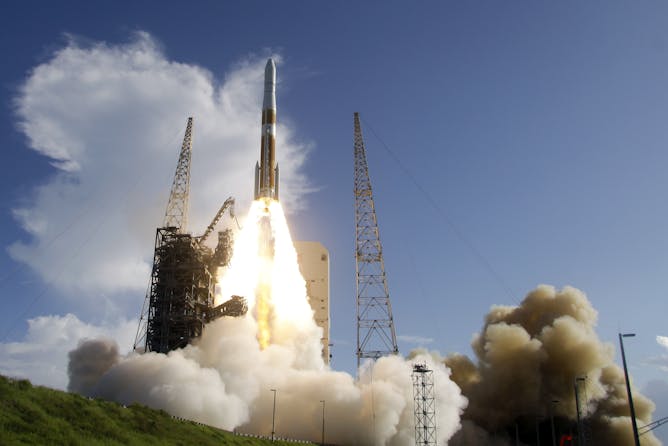|
Top headlines
Lead story
Despite its awe-inspiring beauty, space is an incredibly hostile environment. Humans who leave Earth must work to manage a myriad of threats to their health, from muscle and bone deterioration to cosmic radiation exposure. Spending a long time in an environment without gravity can even cause your brain to sit higher in your skull.
Rachael Seidler is a kinesiologist from the University of Florida who’s spent years working with astronauts to study the health effects of going to space. She’s part of a NASA team that’s trying to understand what health challenges the agency needs to overcome before humans take the long journey to Mars. Seidler outlines some of the key hazards her colleagues are hoping to mitigate and some of the innovations that might make space a little more habitable.
If you find this work as fascinating as I do, I hope you will support the work we do by donating to our brief back-to-school fundraising drive. Thank you!
|

|
Mary Magnuson
Assistant Science Editor
|
|

Rachael Seidler, University of Florida
Space can damage everything from your cardiovascular and nervous systems to your mental health – long voyages can feel isolating for many.
|
Politics + Society
|
-
Klaus W. Larres, University of North Carolina at Chapel Hill
The hostage swap between the U.S. and Iran may be an important step in a new nuclear deal between the West and Iran.
-
Shauna Shames, Rutgers University
Moms for Liberty, founded in 2021 and now boasting 120,000 members, could ride its conservative, limited-government message to a position of strong influence in the GOP.
-
Lynn Greenky, Syracuse University
Trump has not been silenced. The limits on his speech protect fundamental rights − including his right to a fair trial by an unbiased jury and the public’s right to a working justice system.
-
Eric Freedman, Michigan State University; Bahtiyar Kurambayev, KIMEP University
In some cases, it can be difficult for academics to know which journals are not credible – but other times, people feel pressure to publish in these publications.
|
|
Environment + Energy
|
-
Robert Brecha, University of Dayton
The International Energy Agency moved up the date when it expects oil demand to peak to before 2030. Electric vehicle growth is a big part of the reason.
-
Mohammed Ombadi, University of Michigan
There’s a rule of thumb that rainfall intensity increases by about 7% per degree Celsius as temperatures rise. But the increase is much higher in the mountains, scientists found.
|
|
Ethics + Religion
|
-
Pauline Hope Cheong, Arizona State University
A scholar of digital religion explains why the use of AI isn’t necessarily displacing religious leadership: It is the clergy who are helping with the programming, critical for its deployment.
|
|
Economy + Business
|
-
David Maimon, Georgia State University; Saba Aslanzadeh, Georgia State University
Buyers and sellers alike use this system to not get caught.
|
|
Science + Technology
|
-
John van de Lindt, Colorado State University
One way to prevent the destruction wrought by a devastating earthquake – like the one that hit Morocco in September 2023 – is to construct resilient homes and buildings.
|
|
Education
|
-
Debra J. Rosenthal, John Carroll University
Poetry and prose are prominent features in this course about how climate change is affecting the world.
|
|
International
|
-
Sher Jan Ahmadzai, University of Nebraska Omaha
The Biden administration has not ruled out diplomatic recognition of the Taliban. Doing so risks legitimizing the group’s rule without holding it accountable.
-
|
|
|
|
|
|
| |
| |
| |
| |
|
|